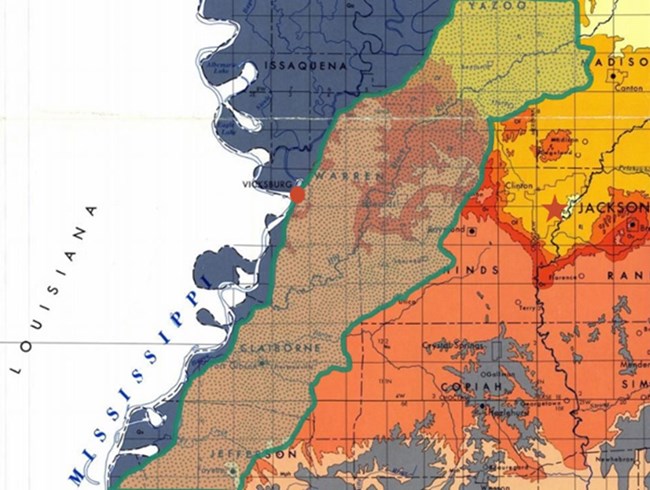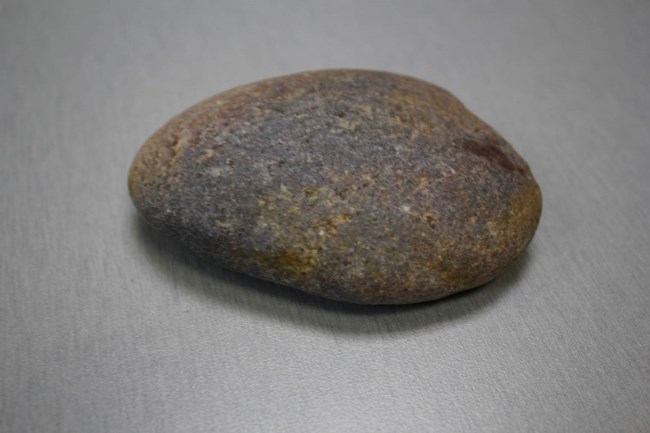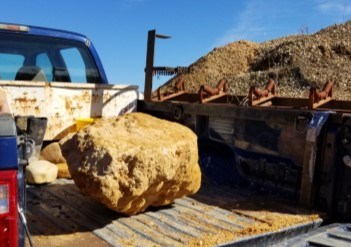
The loess soils that make up much of the surface of the park have shaped both the landscape and the history of Vicksburg. The loess deposits of western Mississippi originated to the north during the Pleistocene Ice Age. As the glaciers in what is now Canada and the northern United States moved, they would grind up the bedrock and other rock debris into a fine flour-like soil. As glaciers melted, this soil was washed down the Mississippi River and deposited on flood plains. Once dried, this powdery soil was picked up by wind before being deposited a second time up on the high eastern bluffs of the river. The loess bluffs trend north-south throughout the state, bordering the river to the south and the Delta to the north. The loess soil has several defining characteristics. It is well drained and rich in nutrients, making it ideal for agriculture, such as growing cotton. It also prefers a vertical orientation and erodes heavily when it is not cut at 90 degree angles. Over the years, the loess soil has created many problems for infrastructure along the loess bluffs of Mississippi. 
Pre-Loess Soil DepositsIn addition the bedrock, other geologic deposits in the park and surrounding area include more recent gravel and soil from the Pleistocene. There are several different gravel deposits in the state of Mississippi, each vary based on the source of their materials and the age of deposition. Here in Vicksburg, the gravel is part of the pre-loess gravel deposits. These deposits were transported down the Mississippi River following an ancient river channel that has since been abandoned. These gravels contain several interesting rocks. Pieces of Sioux quartzite are found in these deposits, which originates in southwestern Minnesota. This rock is one of the oldest rocks found in the gravel deposits (and one of the oldest known rocks on Earth) dating at about 1.7 billion years old. There are many other rocks that make up the pre-loess gravel deposit, although the majority are much younger that the Sioux quartzite. These rocks create a diverse deposit with sources across the Mississippi River drainage basin. Geodes are commonly found in these gravel deposits. These come from a variety of sources and in a variety of forms. They can be lined with quartz, hematite or chalcedony among many other minerals. Chert, agate, jasper, petrified wood and many rocks containing fossils are among the material that make up the pre-loess terrace deposits. The abundance of chert, includes banded chert, oolitic chert and chert containing fossils. For the most part, these cherts all started as limestone and the calcareous minerals was replaced with silica over time. Several types of agates are found in the pre-loess gravel deposits. Agates are distinguished from banded chert by a very distinct banding known as iris banding. Agates are considered a semi-precious stone. Fossils found in the gravel include mainly hard bodied sea creatures such as corals, brachiopods, bryozoan, crinoids and gastropods. Petrified wood is also abundant in the pre-loess gravel deposits. This wood is much younger than the rest of the gravel it is found with. It was most likely petrified around the time the gravel was deposited, about 1 million years ago. 
Among the mostly hand-sized and smaller gravel are the sporadic boulders. Many of these can be sourced back to Minnesota and other northern states. These rocks mainly arrived here in Mississippi through a process known as ice-rafting. Basically, the boulder had been picked up by a glacier (this occurred during the Pleistocene Ice Age when glaciers covered much of Minnesota) and eventually that chunk of ice and debris containing the boulder broke away from the glacier and floated down the Mississippi River before being deposited in Mississippi. |
Last updated: December 28, 2024
